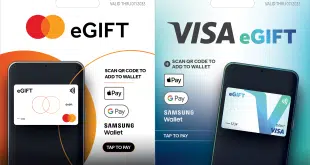North American sales were flat, but leading U.S. point-of-sale terminal maker VeriFone Systems Inc. still posted a 21% increase in revenues on the strength of its international business in the quarter ended July 31, and profits jumped 42%. Fresh from its August acquisition of long-time rival Hypercom Corp., VeriFone anticipates that mobile payments, continuing security upgrades, and services that generate recurring payments will jump-start growth in the U.S. and Canada.
San Jose, Calif.-based VeriFone late Tuesday reported revenues of $317 million in its third quarter of fiscal 2011 versus $261.5 million a year earlier, while net income increased to $26.3 million from $18.5 million. The U.S. and Canada brought in $121.8 million in revenues, off 1% from a year ago and up only 1% from the second quarter, while international revenues jumped 41% over fiscal 2010’s third quarter.
But chief executive Douglas G. Bergeron noted that North American revenues grew 30% in all of fiscal 2010 because of heavy spending by merchants to meet Payment Card Industry data-security standard (PCI) deadlines last year. “So 2011 comps are difficult,” he said. And, putting his best spin on North America’s flat numbers, Bergeron noted that rival Ingenico S.A. recently reported a 25% revenue decline in its North American business while the recently absorbed Hypercom had a 13% decline in its Americas region, all of which means VeriFone gained market share.
Things will pick up again in North America, Bergeron assured analysts in a conference call. Services revenues from data encryption, digital advertising, and other products that generate recurring income streams increased 31% in the quarter versus 19% for so-called system solutions of payment hardware and software. In New York, VeriFone says the Metropolitan Transportation Authority will be deploying 1,000 of VeriFone’s TransitPay systems on Staten Island that will give riders alerts about the location of buses. Some 50 identified retailers now use VeriFone’s encryption services, most recently the 455-store Dick’s Sporting Goods chain.
But a host of what currently are tests or early-stage rollouts of mobile-payments and near-field communication (NFC) technology also could give VeriFone a big lift in the future, according to Bergeron. He also mentioned Visa’s Inc.’s recent announcement to jump-start contact, contactless, and mobile NFC payments in the U.S. “It’s too early to predict what other card networks will do, but directionally, this could mean a complete product refresh over the next several years representing hundreds of millions of dollars in business,” Bergeron said.
VeriFone is participating in some high-profile tests, including Google Inc.’s Google Wallet, which is now live after being announced in May. “The next big phase of the Google rollout is currently planned for the end of the month, where we go from hundreds of locations to tens of thousands of locations,” Bergeron said. He added that VeriFone last week participated in a field demonstration of the Isis NFC-based mobile-payments system being developed by AT&T, Verizon Wireless, and T-Mobile.
Meanwhile, VeriFone is working with PayPal Inc. to bring PayPal services, including NFC, to “hundreds of thousands” of merchants, according to Bergeron.
What does all this mobile and NFC activity mean for VeriFone? “If these initial rollouts lead to wide-scale deployment across the industry, we expect a boost to our revenue for the next several years by a hundred to 150 million dollars per year in the U.S., and even more internationally,” said Bergeron.





